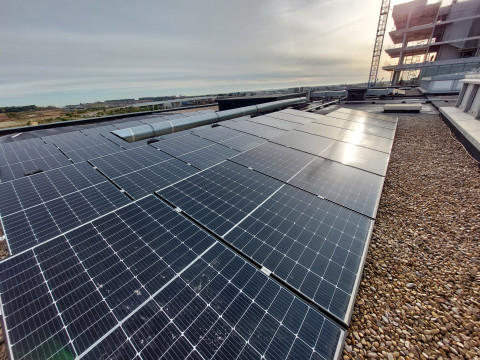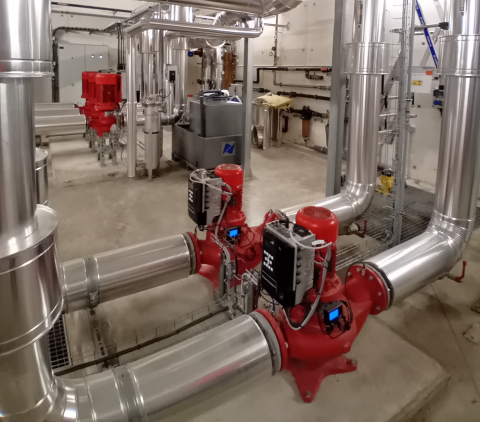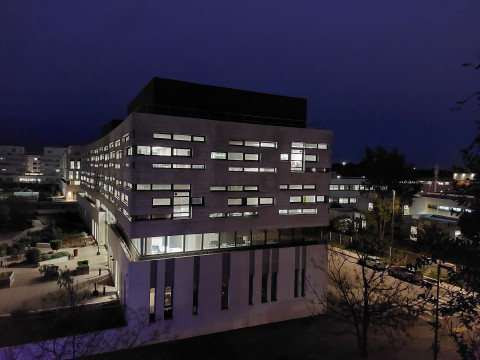OPTIMIZING YOUR ENERGY CONSUMPTION
- 2,200 GWhAnnual energy consumption by local companies [1]
- 23%Energy consumption by service sector buildings [2]
- 50%Percentage of heating in office electricity consumption [3]
REGULATIONS FOR REDUCING ENERGY CONSUMPTION BY 2050
-
Bâtiments neufs :
RT 2012 (règlementation thermique) : exigences de confort et de consommation énergétique
RE 2020 (réglementation environnementale) : sobriété énergétique, impact carbone, confort d’été
Bâtiments existants :
Le décret éco énergie tertiaire (DEET) est une obligation réglementaire qui impose une réduction progressive de la consommation d’énergie finale dans les bâtiments tertiaires de plus de 1000 m² afin de lutter contre le changement climatique.
Plan Local d’Urbanisme Intercommunal (PLUi ) :
Toute construction nouvelle soumise à la règlementation environnementale et dont la surface de plancher est supérieure ou égale à 300 m² doit produire au minimum 45 kWhef/an par m² d’emprise bâtie. À noter que cette disposition ne s’applique pas aux constructions raccordées au réseau de chaleur.
-
Loi APER (accélération de production des énergies renouvelables) :
L’article 40 de la loi APER rend obligatoire l’implantation d’ici 2028 de panneaux photovoltaïques, sur les parcs de stationnement extérieurs existants suivant certains critères.
Plan Local d’Urbanisme Intercommunal (PLUi ) :
Toute construction nouvelle soumise à la règlementation environnementale et dont la surface de plancher est supérieure ou égale à 300 m² doit produire au minimum 45 kWhef/an par m² d’emprise bâtie. À noter que cette disposition ne s’applique pas aux constructions raccordées au réseau de chaleur.
ECO-ACTIONS, ONE OF THE PILLARS OF ENERGY CONSERVATION
We spend almost 200 days a year at the office. Our behavior there has a direct impact on energy consumption. There are simple ways to introduce energy saving measures in your company or business. Turning the heating down by one degree saves an average of 7% in consumption. You can make a real contribution by adopting a series of eco-friendly measures.
METROPOLITAN TOOLS
TO HELP YOU
Montpellier Métropole has developed tools to help companies and local authorities with their energy transition. The metropolitan authority also works in a network with the stakeholders who interact with companies on a daily basis.
Solar Plan
Montpellier Métropole has developed its “Solar Plan for 2050” to promote the adoption of carbon-free energy within its territory by encouraging private and public initiatives.
If you would like to determine the solar potential (thermal or photovoltaic*) of your roof, please check the solar registry developed by Montpellier Méditerranée Métropole.
*Thermal: heat production - Photovoltaic: electricity production

Heating networks
A heating and cooling network is a centralized energy distribution system that can serve several consumers.
Before deciding whether you can connect to the network and use it, you can first check whether your area is served by a heating network by clicking on this link.
What are the benefits of connecting to a heating network?
- Rates are competitive and tend not to fluctuate much.
- Heating networks are supplied mainly by local, renewable, and recycled energy.
- Supply is secure and reliable thanks to a 24-hour on-call service throughout the year.
- Installations are managed by professionals, thus guaranteeing optimal energy and environmental performance of production systems.
- The technical area for heat delivery to your premises is relatively small, essentially comprising a heat exchanger and circulation pumps.

Montpellier Méditerranée Métropole Lighting Plan
Complementing metropolitan actions related to artificial lighting, the Lighting Plan is designed to raise awareness among all stakeholders in the area about ways to combat light pollution.
In this context, the Lighting Plan also highlights the regulatory aspects of the December 27, 2018 decree on light pollution.

OTHER STAKEHOLDERS READY TO WORK WITH YOU
Taking action for the ecological transition
ADEME can provide you with guidance and financial support for all your renovation projects.
Website for the ecological transition of businesses
Easily identify the government assistance programs that are right for your business to implement your ecological transition projects.
MOOC on Energy Savings
This MOOC (massive open online course) is aimed at managers or energy representatives in small service sector companies. It enables them to understand energy issues and identify potential savings.
Environmental responsibility at the office
The ADEME bookshop offers a guide that suggests simple measures and collective actions that you can implement in your company.
FUNDING YOUR ENERGY TRANSITION
Tax credit for microbusinesses and SMEs
This tax credit applies to expenses incurred for work undertaken to improve the energy efficiency of commercial buildings owned by microbusinesses and SMEs.
Standardized Energy Saving Certificates
Standardized Energy Saving Certificates are available for service sector buildings. Technical guides can be used to estimate the incentives that will be paid by energy suppliers based on renovation work carried out.
"Lower the Watts" program
This program helps VSEs/SMEs to control their energy consumption: opening an energy logbook; personalized advice and/or group training, etc.
Green loans
The goal of green loans from Bpifrance is to encourage VSEs, SMEs, and mid-sized companies to undertake ecological and energy transition projects: process optimization; “zero-carbon” mobility; renewable energy
Energy Savings Loans
The aim of energy saving loans from Bpifrance is to encourage small and medium-sized businesses to undertake programs to improve their energy efficiency
Sources
[1]: Data from TerriStory and the regional climate and energy observatory in Occitanie (2021)
[2]: The commercial building sector represents 23% of final energy consumption in the Montpellier Méditerranée Métropole area (Source: Montpellier Méditerranée Métropole's solidarity-based territorial climate air energy plan)
[3]: Heating represents 50% of energy consumption in offices (ADEME)


